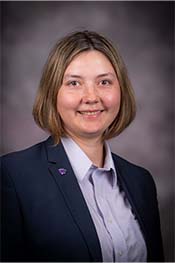Anna Iskhakova
Research Assistant Professor
Contact information
3029 Rathbone Hall
984-289-4025
aiskh@k-state.edu
Education
- Ph.D., Nuclear Engineering, Mechanical Engineering minor, North Carolina State University, 2023
- M. Eng., Thermal Power and Heat Engineering, Moscow Power Engineering Institute, Russia, 2017
- B. Eng., Thermal Power and Heat Engineering, Moscow Power Engineering Institute, Russia, 2015
Professional experience
Anna Iskhakova earned her bachelor’s and master’s degrees from Moscow Power Engineering Institute in Moscow, Russia, in 2015 and 2017, respectively. During her master's studies, she spent several months as a visiting student at the University of Applied Sciences in Germany, where she gained experience in system-level energy consumption calculations for heat pumps. After completing her degrees, she worked in industry, designing HVAC systems for data centers and administrative buildings. Simultaneously, Iskhakova taught a nuclear power plants course at the Nuclear Power Plants Department of Moscow Power Engineering Institute. In 2019, she applied to the nuclear engineering program at North Carolina State University. Upon graduating in 2023, she continued her work there as a postdoctoral research scholar before joining K-State as a research assistant professor in 2024.
Research
Iskhakova's research focuses on:
Computational thermal hydraulics: Developing reliable predictions of two-phase flows with phase changes using direct numerical simulations and an interface-capturing approach, specifically the level-set method. Her work aims to create models that accurately represent bubble dynamics, including nucleation, growth and detachment from surfaces.
Machine learning for model enhancement: Utilizing high-resolution computational data to develop advanced models through machine learning (ML) algorithms. Her research proposes conducting ML-guided coarse grid (CG) simulations for full-scale heat exchangers. A significant source of error in CG two-phase simulations is discretization, leading to inaccurate interface representations. To mitigate this, she proposes a CG correction workflow that incorporates an ML-predicted level-set field into CG simulations. This workflow explores advanced ML techniques, such as super-resolution and Fourier neural operators (FNO), with the ultimate goal of integrating this approach into CG simulations after training the ML algorithms on high-resolution data.
Academic highlights
Iskhakova has authored more than 30 peer-reviewed publications, including five journal articles. In 2023, she received the ALCC award and the Best Graduate Research Poster Award. She is an active member of the American Nuclear Society, the American Physical Society and Women in Nuclear. Additionally, she served as the chair for technical sessions at ANS NURETH-20